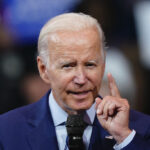There is a simple reason we never read about jihadi attacks in Japan. There are no Muslims there. No Muslims, no terrorists.
This is a significant data point in the public debate over Muslim immigration. Donald Trump, of course, has famously proposed a suspension of Islamic immigration until we can figure out a way to screen out jihadis, and Franklin Graham is backing that suggestion to the hilt.
The primary God-given role of government is to keep us safe. According to Romans 13, this involves the use of lethal force, when necessary, to administer justice and to protect our national security.
The number-one fear today among the American people is a Muslim terror attack. It is our government’s chief responsibility to enact whatever public policies are necessary to reduce that fear and eliminate the threat.
This means there is much we can learn from Japan, which has been virtually free from Islamic unrest. Simple demographics tell the story.
Dr. Mordechai Kedar, writing in The Jewish Press, offers some of the details (emphasis mine throughout):
This country keeps a very low profile on all levels regarding the Muslim matter: On the diplomatic level, senior political figures from Islamic countries almost never visit Japan, and Japanese leaders rarely visit Muslim countries. The relations with Muslim countries are based on concerns such as oil and gas, which Japan imports from some Muslim countries. The official policy of Japan is not to give citizenship to Muslims who come to Japan, and even permits for permanent residency are given sparingly to Muslims.
Japan is a nation of roughly 126 million people. And yet, according to Dr. Kedar, there are only 10,000 Muslims in the entire country. This represents less than one hundredth of one percent. (Other estimates are higher, but none suggest a number above 100,000.) Muslim immigration is officially and culturally discouraged, and a Japanese woman who marries a Muslim man becomes a social outcast.
Contrast this with many European nations who have allowed Muslims with their death-to-the-West ideology to reach 5 to 10 percent of their populations. In France, authorities were relieved disaffected Muslim teenagers only torched 804 cars on New Year’s Eve, down from over 900 the year before. These young devotees of the religion of peace also managed to blow up a public Christmas tree in between firebombing automobiles, and the mere threat of a Muslim terror attack shut down a huge fireworks display in Brussels.
Islamic proselytization is forbidden in Japan, it is very difficult to import Qur’ans into the country, and there are very few mosques. In Japan, Muslim men are expected to pray at home, not in mosques or in the middle of the street as they do in France. Islamic organizations are not allowed, so the Japanese do not have to deal with the incessant stream of propaganda coming from pro-jihadi groups like CAIR. There is only one imam in Tokyo, a city of over 13 million people.
Virtually the only Muslims who are in Japan come as employees of foreign companies. And even that is the exception rather than the rule. “The official policy of the Japanese authorities is to make every effort not to allow entry to Muslims, even if they are physicians, engineers and managers sent by foreign companies that are active in the region.”
The Japanese have a patriotic pride in Japanese exceptionalism, Japanese culture and Japanese traditions, and instinctively recognize that enculturating Islam threatens all that because its value system is so antithetical to what makes Japan Japan.
The resistance to Islamic infiltration is universally shared by the populace at large. “Japan manages to remain a country almost without a Muslim presence because Japan’s negative attitude toward Islam and Muslims pervades every level of the population, from the man in the street to organizations and companies to senior officialdom.”
What’s more, because the Japanese are proud of who and what they are, and because of their allegiance to their own cultural values, they are utterly unapologetic about their resistance to Islam. “The most interesting thing in Japan’s approach to Islam is the fact that the Japanese do not feel the need to apologize to Muslims for the negative way in which they relate to Islam.”
Geert Wilders, the Dutch Parliamentarian who has led the worldwide effort to tell the truth about Islam, has said that Western nations must rediscover the vast superiority of Christian civilization over Islamic civilization, and take a justifiable pride in the Christian heritage of their own country before they are swept beneath the waves of the Muslim tsunami now sweeping over Europe and America.
Concluded Dr. Kedar, “Japan is teaching the whole world an interesting lesson: there is a direct correlation between national heritage and permission to immigrate: a people that has a solid and clear national heritage and identity will not allow the unemployed of the world to enter its country; and a people whose cultural heritage and national identity is weak and fragile, has no defense mechanisms to prevent a foreign culture from penetrating into its country and its land.”
Taking humble and grateful pride once again in what God has done to make America the most exceptional nation in history is not only the right thing to do, it is the safest thing to do.
Bryan Fischer hosts “Focal Point with Bryan Fischer” every weekday on AFR Talk (American Family Radio) from 1:00 – 3:00 p.m. (Central).
—-
This content is published through a licensing agreement with Acquire Media using its NewsEdge technology.


















Recent Comments